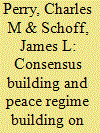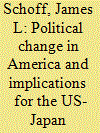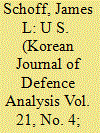| Srl | Item |
| 1 |
ID:
053784


|
|
|
| 2 |
ID:
097345


|
|
|
| 3 |
ID:
163370


|
|
|
|
|
| Summary/Abstract |
This article examines the domestic political dynamics behind US president Donald Trump’s “America First” approach to trade and foreign policy, to understand better how long this strain of American economic nationalism might last and what it means for Japan’s national security strategy. The political base for Trump’s trade protectionism and apparent indifference to allies has roots stretching back into American history, but this movement has strengthened in recent years due to a combination of growing economic inequality in the United States, demographic changes, and the impact of fast-paced technology development and economic globalization. These political trends are likely to persist beyond Trump’s presidency, although some potential negative effects on Japan and the US-Japan alliance in the medium-to-longer term can be mitigated by Japan’s proactive foreign policy and other steps. The alliance still offers a great deal of value to both countries—now and into the future—but Japan should consider a slightly larger global leadership role in concert with others, even as the allies work to enhance their continued cooperation on shared interests.
|
|
|
|
|
|
|
|
|
|
|
|
|
|
|
|
| 4 |
ID:
093906


|
|
|
| 5 |
ID:
135933


|
|
|
|
|
| Summary/Abstract |
Rarely before has such a large and potentially consequential country tried to reform itself politically and economically as Myanmar is now attempting, following an extended period of extreme isolation and amid unprecedented international and digital connectedness that exists today. This is a challenge not only for Myanmar, but also for the United States and Japan as they try to facilitate this transformation in productive ways, in a coordinated fashion, and consistent with their own foreign policy and commercial interests. A pertinent question, therefore, is whether or not Washington and Tokyo are inclined and prepared to address Myanmar's transition as an alliance issue, and if they are, then what is an efficient and effective way to go about this task.
The answer is mixed, for despite their pursuit of many common interests, the policy priorities and policy making environments in the United States and Japan differ significantly. In simple terms, the United States has a “democracy first” agenda in Myanmar that sometimes limits its options, while Japan takes a more flexible approach in order to maximize engagement and business opportunity. Still, President Obama and Prime Minister Abe provided a mandate in April 2014 to strengthen alliance cooperation in Southeast Asia (and in Myanmar in particular), and the two countries have complementary strengths and local networks that can be leveraged more effectively for the benefit of all.
Despite US concerns about stalled political liberalization and human rights abuses in Myanmar, Washington should take a longer-term horizon for evaluating reforms and consider enhancing its leverage with Myanmar through more effective policy coordination with Japan (which is a major player in the country), rather than the maintenance or reapplication of sanctions.
|
|
|
|
|
|
|
|
|
|
|
|
|
|
|
|